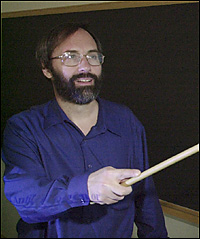George Ledlie Prize goes to physicist Gerald Gabrielse
A physics professor who has devised ingenious methods for manufacturing and observing antimatter has been awarded the George Ledlie Prize by the President and Fellows of Harvard College.
Gerald Gabrielse, the George Vasmer Leverett Professor of Physics in the Faculty

of Arts and Sciences, received the award for his “stunning” scientific accomplishment of creating antimatter, according to Provost Steven Hyman.
“As the head of an international team of physicists at CERN [European Organization for Nuclear Research], Professor Gabrielse developed the techniques to accumulate antiprotons at energies more than 1010 times lower than previously realized,” Hyman said. These techniques allow for extremely accurate measurements of the properties of matter and antimatter.
“Gerald Gabrielse’s achievements in pushing back the frontiers of knowledge are nothing less than extraordinary,” said Harvard President Lawrence H. Summers. “His work not only throws light on some of the fundamental questions about the nature of matter, but has also led to several technological advances in other fields, such as medicine.”
In recommending Gabrielse for the award, FAS Dean William C. Kirby explained that the goal of his experiments is to “ultimately help to solve puzzles about antimatter’s presence in the universe. The spin-off technology associated with this work has been a benefit in its own right, helping advance nuclear magnetic resonance, and magnetic resonance imaging techniques.”
Gabrielse said that the prize is “as unexpected as was the original invitation to join Harvard’s faculty years ago. Recognition at home is sweet, especially for work done while department chair; only the Levenson teaching prize was sweeter.”
While serving as chair of the Physics Department for the past three years, Gabrielse commuted for half of each year from Boston to Geneva to lead an international team of scientists working to produce and study cold antihydrogen. The arrangement, he said, “actually seemed to work though I was a bit scared when I started. This prize, and the Davisson-Germer Prize from the American Physical Society, reassure me that my research career survived my time as chair.”
Gabrielse has been professor of physics at Harvard since 1987. Currently he leads the international ATRAP (antihydrogen trap) Collaboration whose goal is accurate laser spectroscopy with trapped antihydrogen atoms. The group’s nested Penning trap, invented and demonstrated at Harvard as a method for getting cold antiprotons and cold positrons to interact, is the crucial device that first permitted the observation of cold antihydrogen.
Gabrielse graduated with honors from Calvin College in 1973. He attended the University of Chicago, receiving his M.S. degree in 1975 and his Ph.D. in 1980. He became a postdoctoral research fellow at the University of Washington in 1978. Working under the supervision of Professor Hans Dehmelt, who later shared the Nobel Prize in physics, Gabrielse built an apparatus in which he confined a single electron by itself for more than 10 months.
Gabrielse was awarded the Levenson Teaching Award for a senior faculty member at Harvard for his “Reality Physics” course for nonscience students, and was awarded the 2002 Davisson-Germer Prize by the American Physical Society “for pioneering work in trapping, cooling, and precision measurements of the properties of matter and antimatter in ion traps.”
The Ledlie Prize is awarded every two years to someone affiliated with the University who “since the last awarding of said prize has by research, discovery or otherwise made the most valuable contribution to science, or in any way for the benefit of mankind.” Robert B. Woodward, the Morris Loeb Professor of Chemistry, was the first recipient in 1955. Others winners have included Judah Folkman, the Julia Dyckman Andrus Professor of Pediatric Surgery; Douglas Melton, the Thomas Dudley Cabot Professor of the Natural Sciences; and Sara Lawrence-Lightfoot, the Emily Hargroves Fisher Professor of Education.




